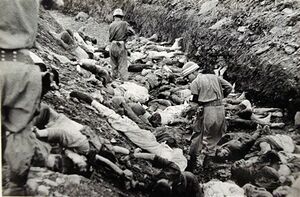Anti-communism
Anti-communism or anticommunism is a term for any ideology or movement which opposes the spread of communism. Before the Second World War, anti-communism was often associated with anti-Semitism, but after the events of the Holocaust, this became patently unviable, and a new form of anti-communism was formulated based on a new opposition between liberal individualism and totalitarian collectivism. Starting in the 1940s, the United States used its covert and overt influence to spread this ideology throughout the world, suppressing opposing media organizations, political parties, and even academics in favor of anti-communist groups and even left-wing anti-communists such as postmodernists and anarchists. Modern anti-communists tend to sound strikingly alike regardless of ideological persuasion, indicating the lasting influence of this propaganda blitz, and modern academia shows similar degeneration even in the wake of the fall of the Eastern Bloc and subsequent revelations from the Soviet archives.
Jewish Bolshevism
Jewish Bolshevism was the predominant anti-communist theory from the turn of the 20th century until at least the 1950s, including among Russian, American, and German anti-communist movements such as the Whites and the Nazis.
McCarthyism
McCarthyism or the Second Red Scare comprised a peak of "red-baiting" in US politics during the 1940s and '50s. Although the communist hysteria had roots in the conservative opposition to the progressive policies of FDR, politicians like Joseph McCarthy and Richard Nixon elevated it into a headline issue when they accused the Democratic Truman administration of being infiltrated with communists and communist collaborators. American elites, especially the media, exploited highly publicized stories, such as the trial and execution of suspected Soviet spies Julius and Ethel Rosenberg, in order to effectively saturate American public opinion with anti-communist talking points. Senator McCarthy himself gained political influence by accusing progressively larger and more prominent figures of harboring communist sympathies, often in combination with virulent homophobic attacks, but his influence quickly waned after 1954, when he attempted to take on the Army in a series of nationally televised hearings. However, even McCarthy's many critics usually attacked him as an overzealous "witch hunter" who had targeted innocent non-communists for political gain. The question of his right to even discriminate against American citizens on the basis of their political persuasion went largely unasked.
McCarthyism at its height could be analyzed as a form of moral panic or "culture war", a phenomenon which has largely defined American reactionism to the present day. McCarthyist actions included blacklisting perceived communists from holding influential positions and banning certain books, including, in one instance, the Robin Hood legend: "[Communists] want to stress it because he robbed the rich and gave it to the poor. That’s the Communist line."[1] The FBI investigated even vaguely anti-capitalist films such as 1946's It's a Wonderful Life.[2] But most of all, the US government and conservative labor organizers collaborated to root out communists, socialists, and "fellow travelers" from the American labor movement.
The impact of McCarthyism on American labor was devastating. In the early 20th century, radical leftists had been widely acknowledged as the most effective and motivated organizers in the labor movement.[3][4] Anti-communist organizer John L. Lewis of the United Mine Workers hired communist organizers only to purge them once they had won the campaign, infamously stating, "Who gets the bird, the hunter or the dog?"[5] Perhaps more important, communists were also responsible for furthering the workers' class consciousness through agitation and education. The McCarthyist elimination of communist "influence" in the unions they themselves had helped to build thus could have contributed to the weakness of the working class during the era of embedded liberalism: by the 1960s, red-baiting and union purging led to an atmosphere of accommodation that had denatured the ideological character of the American labor movement into "a fight without ideologies, without red flags, without May Day parades."[6] This would eventually soften the ground for the arrival of neoliberal ideology once disillusionment with radical unionism and the ideologically neutered "Big Labor" had set in.[7]
See also
References
- ↑ Bigelow, Bill (1 Mar 2023). "The Green Feather Movement". Zinn Education Project. Retrieved 13 Jul 2023.
- ↑ Nichols, John (24 Dec 2021). "That Time the FBI Scrutinized "It's a Wonderful Life" for Communist Messaging". The Nation. Retrieved 13 Jul 2023.
- ↑ Lichtenstein 2002, pp. 27, 45–46.
- ↑ McAlevey, Jane F. (2018). Template:Citation/make link. Oxford University Press, USA. Template:Citation/identifier. McAlevey, Jane F. (2018). No Shortcuts. Oxford University Press, USA. pp. 27–40 passim. ISBN 978-0-19-086865-9. See also section on influence of anti-communist organizer Saul Alinsky: pp. 40-58 and throughout the work.
- ↑ McAlevey 2018, p. 32.
- ↑ Lipset, Seymour Martin (1960). Template:Citation/make link. New York: Doubleday and Company. Template:Citation/identifier. Lipset, Seymour Martin (1960). Political Man: The social bases of politics. New York: Doubleday and Company. p. 408. OCLC 1024685999.
- ↑ Lichtenstein, Nelson (2002). Template:Citation/make link. Template:Citation/make link (1 ed.). Princeton University Press. Lichtenstein, Nelson (2002). "Chapter 4: Erosion of the Union Idea". State of the Union (1 ed.). Princeton University Press.
